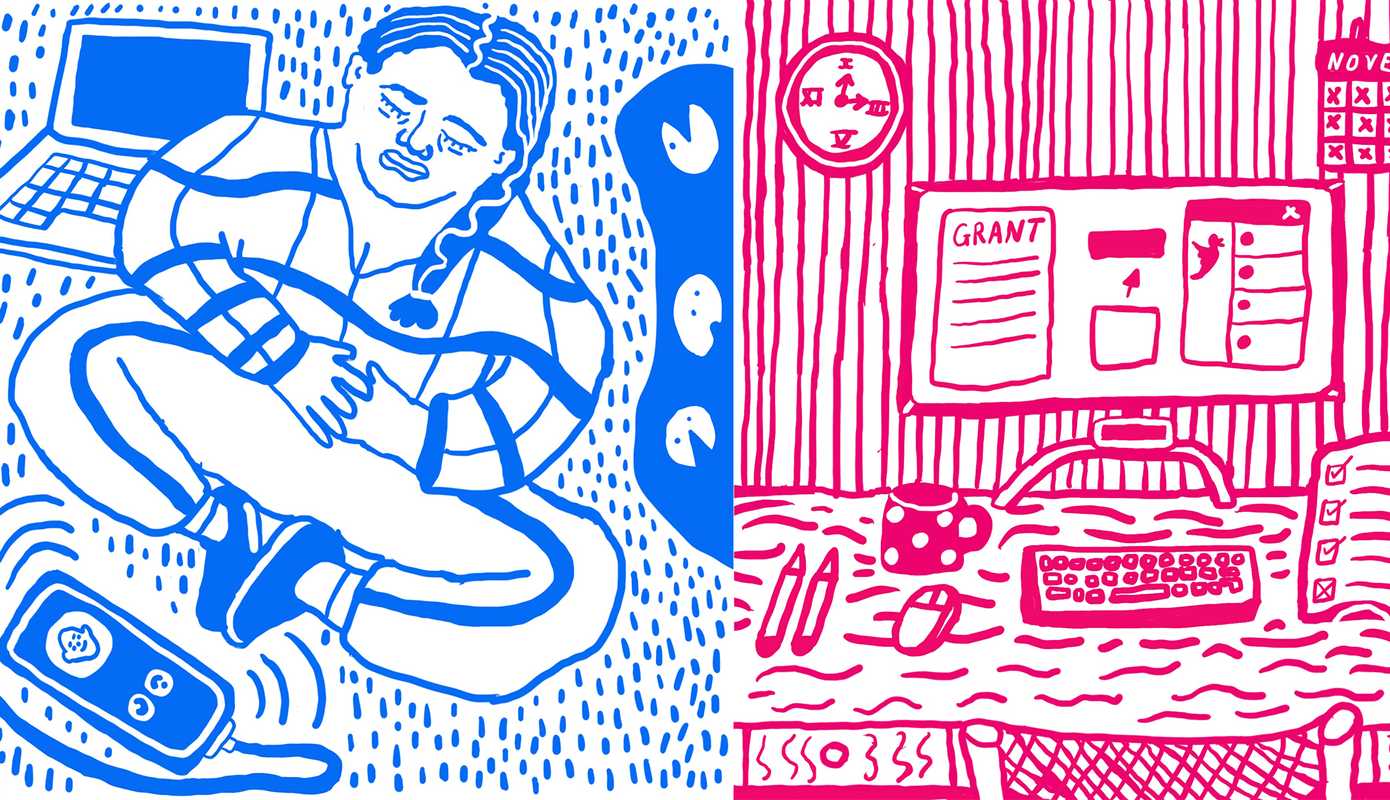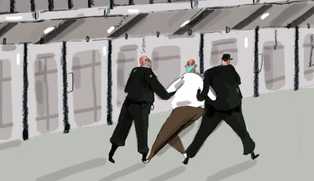This article was made possible by donations to the Black Creatives Fund. Donate now.
Sasha and Nick (names changed to protect anonymity) met at a community event to raise funds for young Black neurodiverse people in the North East of England. Sasha works a nine-to-five as an academic professional. Nick works as a freelancer, doing various art-based projects, working on commissions, and facilitating user-led art groups. The two discovered that they shared a commitment to speaking up about the politics of disability.
And it bears speaking about. Almost half of the UK’s disabled population are not employed, and those who are earn about 12% less than their nondisabled counterparts. Disabled people of colour earn even less; a landmark 2012 report found that half of disabled people of colour live in household poverty, compared with 1 in 5 of all disabled people in the UK.
In this illustrated conversation, recorded in August 2020, Sasha and Nick discuss navigating the creative and social sciences sectors in the North East as Black, disabled, neurodivergent, and chronically ill workers. They talk about managing work, financial (in)security, the role of unions, and self-care in a pre- and post-pandemic landscape.
Illustrations by Monique Jackson. The conversation has been edited for length and clarity.
Nick: I arrived in England about 8 years ago, for studies initially. I never finished my degree, instead I decided to get creative within the network of people I knew from the university and community centres in the North East. This network expanded over the years and one thing led to another. It hasn’t always been easy to find commissioned work, because of the labour market and my mental health journey. So there were some gaps in work over this period of 7 years.
Sasha: You mention your condition as a neuro-diverse person?
N: Having a neurodiverse mind is a form of disability. Experiencing mental health struggles is a form of disability. These things create barriers between the person and their access to a full life in society.
[It manifests through] my emotions. I react to things more intensely than others. I feel very intense emotions when I consume news from the external world. I try to regulate my exposure to the media. I can feel very high and very low on the same day not for a reason that I can rationalise.

S: That resonates with me. About a decade ago, I needed something a little wild and bigger in my life. So I moved to Texas to be a volunteer instead of finishing my bachelor degree. For seven months, I lived the “American Dream.” I cut down giant trees in a state park. I’ve worked in an animal shelter, at start-ups.
N: You haven’t told me this before. It sounds like another Sasha!
S: I know. I had a whole other life before coming to academia. Right now, I work 9-5 in an office and I thank my lucky stars for that. As a freelancer, how do you find work? Are clients approaching you? Or do you apply for grants to undertake particular projects?
N: This is a full time job in its own right (laughs). I have a Twitter account and I follow certain accounts that offer commissions regularly. I apply for grants. I try to attend conferences and do some networking. I try to make myself useful, to fill in surveys, to be active in unions in the North East.
COVID scheduling has allowed me to get out of the comfort of my North East bubble – through Zoom, first and foremost. Despite all its challenges, Zoom has made many more events accessible to me, and to others with disabilities by adding subtitles, by hiring Sign Language interpreters for those that may need the service. However, where I live one of the main political issues in the last few years has been the lacking affordability and connectivity of technology services. The lacking infrastructure in the North East is a scandal – it makes the internet costly, unreliable and inaccessible to many.

S: I get you, I have similar grievances around the North East’s connectivity issues.
While searching for commissioned work, have you come across any projects that you were interested in doing, but then when you read the requirements you realised they did not fit with the way you wanted to work and so you didn’t apply?
N: Many times. There are some red flags. For instance, artistic organisations that require the applicant to oversell themselves. I don’t want to have to be in that game of celebrity. I also don’t want to work in an organisation that is too competitive. I know it’s part of the game but it’s not for my stomach, I know that. And of course I don’t want to work for organisations that are for growth ad infinitum. I prefer to work locally, I prefer to work with my neighbours. And I like to have this flexibility between being responsible for myself and being a soldier in a team.S: I love your self-discipline and passion. It requires that you constantly answer: why am I doing this? When you sign a contract, are you able to negotiate reasonable adjustments?
N: I’ve done so many times. Before I accept the contract, I try to discuss and include a clause outlining what happens if I cannot deliver the agreed output by the given date. I’m quite happy that the organizations I’ve partnered with are quite understanding and accommodating.
During COVID, and in the post-Covid world, a lesson organisations and individuals must learn is to prioritise self-care. This is why I reacted how I did to your postponement email. If I feel that something is too much on a given day? Postpone it. If this is something that I cannot manage, my stress levels are high, I’m in a zone of discomfort and if I have the chance, I prefer to reschedule it because I see my self-care as a priority. This is something that I discuss openly.
S: I appreciated that.
N: I demand the same for others in meetings, in conferences, too.
S: Totally! And today’s claim for access is greater than ever. Everyone deserves the chance to fit in.
For unpleasant work situations, for example not being paid on time, do you have an ally to lean on for support? A trade union for freelancers? What is your relationship with the trade union?
N: That’s a good question. I recently joined collective efforts to unionize our sector. I think it is important to be unionised, to be aware of your rights and to have a safety net. I’m an immigrant, I’m a Black, neurodiverse person; being unionised gives me a safeguard.

S: Do you think trade unions are doing enough to support gig economy workers in the UK?
N: I think they have an active grassroots presence. They do what they can, but I think the struggle is bigger. Resources are scarce and the challenges are enormous, especially in times of social distancing. The gaps that people are falling through every day are very real. And there is much violence, financial violence, and marginalisation. I know that the unions are on our side, but I also feel that much more must be done. To begin with, unions must constantly listen to their constituencies. Increase the diversity in the top leadership. Think strategically because now the employment game has changed, the rules around employment have also changed.
We’re going fully digital, but what about people who are not familiar with new mediums or cannot afford a stable connection? I think we have to get a bit more radical in what we demand. I know that there is a long debate about Universal Basic Income. I think we should ask not only for that, but for Universal Basic Resources: access to healthcare, access to social rights, access to the internet, all of these at once. Trade unions can voice all of this to the top: to the political class, to the economic class, to the decision makers.
S: My experience with trade unions is that when you do try to move the needle, a culture of defensiveness gets in the way. When I joined faculty in my university, I developed the strategy of asking a lot of questions to eventually get past that defensiveness. I also believe a culture of individualism pervades academia. Individual personalities, egos, work-flows all complicate the work.
N: I am a member of many Black-led campaigning groups that are very helpful in advancing the causes that are dear to my heart. Faith groups, disability groups, user-led groups that are locally routed and affect peoples’ lives directly. These are my communities. These are my people. Trade unions are just part of the picture but it’s not the only constituency for one to have a say to get their voices heard in the public debate.

S: I know that you were born outside of the U.K. What experiences have you had of the social security system in this country? Our experiences may differ – I am a Black, UK-born, single mother and get child support.
N: Complicated. Too much paperwork. It was a shock for me to go through this labyrinth and to do all of this digitally. I was not capable of doing that. It took me an awful long time to understand which unit, which department to turn my question to. I try to keep an eye on the changes, there’ve been lots of changes over the last eight years.
S: We live in times where there’s a culture of urgency. It’s difficult to take time to relax and enjoy ourselves, to come together with family and friends or to think beyond money. I personally escape through books and play. I also really like dinosaurs, Yorkshire puddings and gravy, dungarees, books and board games.
N: Ah, lovely. I am spending time with my plants, spending time gardening, going out for walks, calling friends, and swimming when I can. In many ways, I just take the time for myself. I’m a proud daydreamer. Lying down in a bed is also a form of resting. This is something I don’t share with strangers…
S: Why shouldn’t it be a thing to say loud? My friends’ and colleagues’ working hours have been intense lately and I see the negative impact on them. Their motivation is running low. Their philosophy appears to be one of subsistence, doing the minimal on a day to day basis. But when everything becomes about the work or the daily grind, it’s easier to go on autopilot than to think creatively, diplomatically or inclusively. This kind of attitude doesn’t lead to change, it leads to shortcuts.
N: Before landing in Newcastle, I spent six months as an intern in a big corporation. Having lived through that I now realise that I’m perfectly fine with the trade-off of flexibility and income fluctuation for a greater sense of liberty, a greater sense of freedom over my time, over the things I enjoy. It’s a conscious choice. It’s because what I am doing is creative and it has to do with healing. This is not a job, it’s a passion.
S: I get you and I find it admirable. Recently, some politicians on the telly said that in order to reduce the disability employment gap, disabled, neurodiverse and chronically ill workers should embrace the gig economy. Would you agree with that?
N: Are we asking people to fit into the box or designing the box tailor made so it can fit the individual? I think that in the 21st century in so-called liberal democracies, this should not be a dilemma. We make, we design, we renew the box so it can fit everyone. This is non-negotiable; it shouldn’t be formulated as a dilemma.

Now is the time to imagine the day after, the society we want to live in. We should organise, both trade unions and other groups, we should host citizens panels to draft our own manifestos. What if we abolish work, and instead find a way of distributing wealth that respects the environment, that respects all species, in a way that upholds humanity and the planet? We need to uphold humanity on a planetary level.
S: That is a suggestion worth exploring! For a creative mind like you, what does the idea of being “a productive member of society” mean to you?
N: Judgement. Someone is judging me, someone has put together a list and I have to tick the boxes. I don’t ask such questions and I do not like others to ask such questions of me. I think care is the opposite of production. We are harming ourselves in the way we define productivity.
S: How can we replace this awful notion that is so dominant in our lives? On what basis should we value people in society?
N: On a new code of ethics. Are you a good citizen? Are you ethical as a person? Do you embrace a set of values around which a society for everyone can be formed? How do you contribute to the wellbeing of your community? We can learn to value people by valuing other forms of contribution, by acknowledging other ways people can make a difference and add value in the community, paid or unpaid.

There is a new term based on research at Gothenburg University: “person-centred care.” An individual in crisis – an individual with bio-socio-psychological challenges – is not treated as a patient, but is treated as a person, is treated as a person full of capabilities. Healthcare workers enter into an equal relationship with the person they are serving. Together they draft a healthcare plan where the individual has a say, and is not treated as a child. The person has a say in their condition. I think this person-centred care should replace the whole thing about productivity.
S: Really inspiring thoughts, Nick. I recently came to an executive position, and every day I see evidence – despite reaching the point of crisis where Black women are finally called to lead – that the foundational conversations we need to have about what led us to this crisis in the first place are being avoided. I want to see that you’re not asking me to come in and fix the mess, that you’ve actually done your own work to help this office heal, to help build stronger relationships with the community. Otherwise, we are given the sense that we are being set up to fail.
N: Given your sphere of influence, what concrete steps did you take?
S: I built a team of people committed to working together, and watched them start to enjoy their collaborations with each other. I got to learn from them. And I asked big questions of my colleagues, and saw the solutions that they came up with. After considering everything, I decided that yeah, I think we can make that happen. That was very rewarding.
N: Working with people through the arts, especially younger groups, is the joy of my life. I’m so grateful that I get to work with positive, creative and optimistic folks, and that I get to use the tiny power I have to lift up other people. I also wonder what ways can I expand access to worlds because there are brilliant people who are not sitting at the same table and I need them at the table with us, because I’m tired.
S: Totally!
We’ve talked about rest, resistance, work. In light of this, what would your message be to the universe?
N: Caring is doing, but it is also a debate. Inhabit and take charge of all your own contradictions. Embrace your vulnerability. Your message?
S: Seek self-help, avoid burnout, and keep some positivity. Offer positive visions for the future.
N: Remember if the box doesn’t fit you, throw it. Don’t try the second time, the third time – just throw it. If it’s not for you, it’s not worth the effort.




